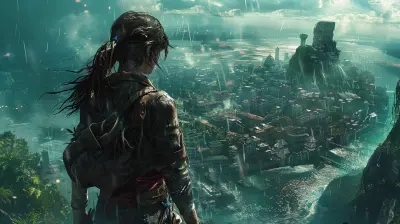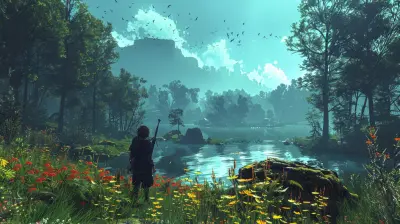The Story Behind Konami’s Iconic Games and Their Decline
19 June 2025
Let’s be honest: when you hear “Konami,” your mind probably drifts to memories of gripping a controller while defeating bosses in Metal Gear Solid, scoring impossible goals in Pro Evolution Soccer (PES), or frantically mashing buttons in Contra. For decades, Konami was a household name in gaming, a giant that stood shoulder-to-shoulder with industry titans like Nintendo, Capcom, and Sega. But in recent years, they’ve fallen from grace in a way that’s left gamers scratching their heads and wondering: What the heck happened to Konami?
From their meteoric rise with some of the most celebrated franchises to their baffling decisions that led to their current decline, Konami’s journey feels like an epic tale—one that’s part triumph and part tragedy. So, buckle up, and let’s dive deep into the story behind Konami’s iconic games and their fall from the gaming Olympus.![]()
Humble Beginnings: From Slot Machines to Gaming Royalty
Believe it or not, Konami didn’t start out as a video game company. Back in 1969, Konami was founded by Kagemasa Kozuki as a jukebox repair business in Osaka, Japan. Yep, jukeboxes! It wasn’t until the 1970s that Konami transitioned into amusement machines like coin-operated games, eventually stepping into the video game market.Their early arcade hits like Frogger and Scramble put them on the map, but that was just the tip of the iceberg. As the gaming industry exploded in the ’80s and ’90s, Konami saw an opportunity to innovate and capitalize on the growing home console market. Spoiler alert: they absolutely nailed it.![]()
The Golden Era: Konami’s Dominance in Gaming
The ’80s and ’90s were what I like to call Konami’s golden era. It’s the period when the company churned out hit after hit, creating franchises that still tug at the nostalgic heartstrings of gamers everywhere. Let’s take a trip down memory lane with some of their masterpieces.1. Metal Gear Solid
It’s impossible to talk about Konami’s success without mentioning the Metal Gear Solid series, created by Hideo Kojima. First released in 1987 as Metal Gear, this stealth-action game bucked the trend of run-and-gun shooters to offer a narrative-driven, tactical experience. By the time Metal Gear Solid dropped in 1998 for the original PlayStation, it had become a global phenomenon. Snake wasn’t just a character; he was an icon. And let’s not even mention those mind-bending plot twists that made your jaw hit the floor.2. Castlevania
If you’ve ever been sucked into a dark, gothic world full of vampires, you’ve got Konami to thank. Castlevania, first released in 1986, pioneered the “Metroidvania” genre (which, fun fact, it shares credit for with Nintendo’s Metroid). Its blend of exploration, combat, and challenging gameplay cemented it as one of the greatest franchises ever. Fans still swear by entries like Symphony of the Night that defined gaming in the late ’90s.3. Silent Hill
Now, here’s where things get creepy. Silent Hill, which debuted in 1999, took survival horror to new levels. Its eerie atmosphere, psychological storytelling, and haunting soundtrack ensured that players didn’t just play Silent Hill—they felt it. The game didn’t rely on cheap jump scares; it burrowed into your brain and left a lasting impression.4. Pro Evolution Soccer (PES)
For sports lovers, PES (known as Winning Eleven in Japan) was the holy grail of football games. While its rival, FIFA, might’ve hogged the licensing spotlight, PES won fans over with its fluid gameplay and realistic mechanics. For years, it was the go-to game for soccer purists.Konami’s Decline: The Slow Burn
So, if Konami was on top of the world, what went wrong? Why did one of gaming’s brightest stars fade so dramatically? The answer, my friends, isn’t simple. But it boils down to a mix of internal conflicts, questionable decisions, and the company’s pivot away from gaming.1. The Hideo Kojima Saga
Let’s cut to the chase—Hideo Kojima and Konami had a messy breakup, and it hurt everyone involved. Kojima, the mastermind behind Metal Gear Solid, had long been the creative force driving Konami’s success. But by the mid-2010s, tensions between Kojima and Konami reached a boiling point during the development of Metal Gear Solid V: The Phantom Pain.The result? Kojima left Konami in 2015 under less-than-amicable circumstances. Fans were outraged, especially when Konami decided to cancel Silent Hills, a highly anticipated reboot featuring Kojima and filmmaker Guillermo del Toro. The infamous P.T. demo remains a symbol of what could’ve been.
Without Kojima, Konami lost not only a legendary creator but also the trust of millions of fans. It was like a band losing its lead singer—things were never quite the same.
2. Pivot to Pachinko
Here’s where things get weird. Instead of doubling down on AAA games, Konami shifted its focus to the pachinko machine market. For the uninitiated, pachinko is a gambling game in Japan that’s kind of like pinball on steroids. While pachinko is hugely profitable in Japan, it left gamers worldwide scratching their heads. Why was Konami abandoning beloved franchises for slot machines?What made it worse? Konami started releasing pachinko versions of their classic franchises. Imagine wanting a new Castlevania game but getting a Castlevania-themed pachinko machine instead. Ouch.
3. The Mobile Gaming Bet
As if the pachinko move wasn’t enough, Konami also shifted focus to mobile gaming. Sure, mobile gaming is a booming industry, but Konami’s abrupt shift left console and PC gamers feeling alienated. Instead of creating new masterpieces, they were re-releasing old games or creating seemingly half-hearted mobile adaptations of their franchises.The Fallout: A Fractured Legacy
The fallout from Konami’s decline has been felt across the gaming community. Fans have expressed frustration, disappointment, and even heartbreak over the company’s decisions. Many of Konami’s once-thriving franchises now sit in limbo, with no word of meaningful updates or sequels:- Silent Hill: After years of radio silence, fans finally got an announcement of new Silent Hill projects in 2022. But for many, it felt like too little, too late.
- Metal Gear Solid: With Kojima gone, any future Metal Gear projects feel uncertain. The news of a Metal Gear Solid 3 remake stirred excitement but also cautious skepticism.
- PES (eFootball): Konami rebranded PES to eFootball, but the transition was a disaster. It launched with bugs, bad graphics, and poor reception, leaving many fans longing for the glory days.
Is Redemption Possible for Konami?
Here’s the big question: can Konami make a comeback? Honestly, it’s not impossible. Gaming is an industry that thrives on comebacks (just look at Capcom, which went from struggling to killing it again with Resident Evil and Monster Hunter). Konami still has goldmines under its roof, and with the right leadership, they could turn things around.Fans are still waiting—perhaps not patiently—for the day when Konami returns to its roots. Whether it’s a proper Silent Hill game, a new Castlevania, or the rebirth of Metal Gear, the potential is there. The question is: does Konami still care about its legacy, or are they happy sticking to pachinko and mobile games?
Wrapping It Up
Konami’s story is a fascinating one, filled with moments of brilliance and baffling decisions. They were once a titan of the gaming world, shaping the childhoods of millions with their unforgettable franchises. Sadly, their recent years have been marked by alienation, controversy, and an apparent loss of direction.But as gamers, we’re nothing if not hopeful. Even if the Konami we knew and loved seems like a distant memory, there’s always a chance for redemption. Until then, we’ll keep revisiting their classics, sticking it to Dr. Wily in Contra or getting lost in the fog of Silent Hill, and remembering just how incredible Konami was during its prime.
all images in this post were generated using AI tools
Category:
Gaming HistoryAuthor:

Madeleine McCaffrey
Discussion
rate this article
3 comments
Abigail Fisher
Konami's journey reflects the ebb and flow of creativity and commerce in gaming. Their iconic titles shaped the industry, yet their decline serves as a reminder of the importance of innovation and audience connection.
June 22, 2025 at 3:11 PM

Madeleine McCaffrey
Thank you for your insightful comment! Indeed, Konami's legacy highlights the delicate balance between creativity and commercial success in the gaming industry.
Sylas Sheppard
A fascinating look at Konami's rise and fall—exploring how iconic titles shaped gaming history and their recent struggles.
June 22, 2025 at 3:50 AM

Madeleine McCaffrey
Thank you! I'm glad you found it fascinating. Konami's journey is indeed a compelling story of innovation and challenge in the gaming industry.
Zephyra McAuley
Konami's journey is a testament to creativity and resilience. While challenges arise, their legacy inspires future game developers to innovate and elevate gaming to new heights! Keep believing!
June 21, 2025 at 4:06 AM

Madeleine McCaffrey
Thank you! Konami's legacy indeed reflects both creativity and the drive to overcome challenges, inspiring future developers to push boundaries in the gaming industry.



